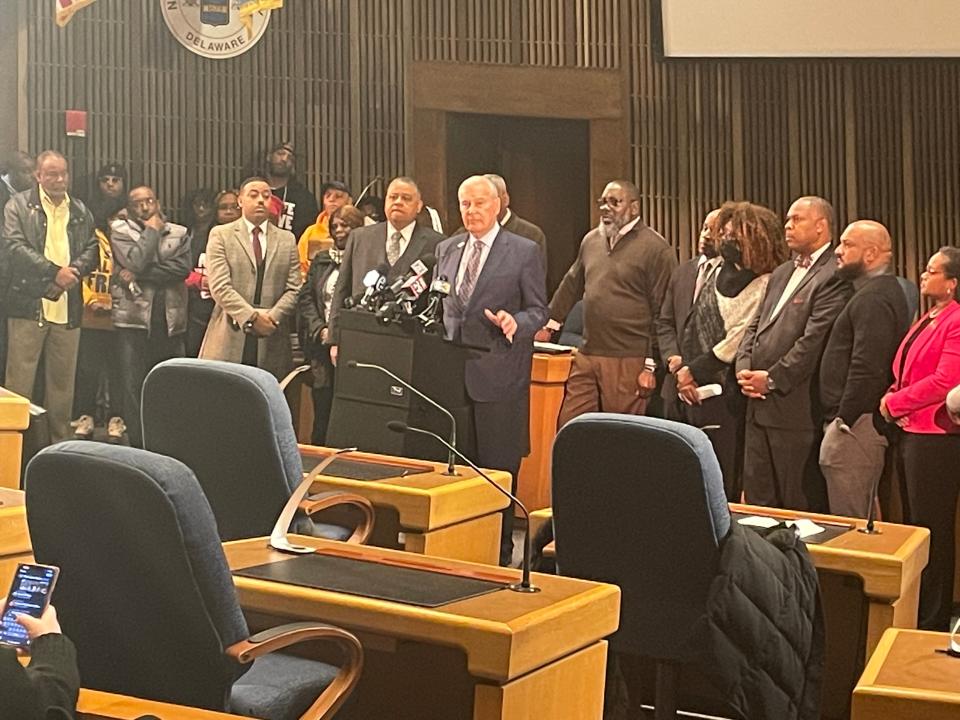Tyre Nichols' death reignites calls for police reform. Here's how local leaders reacted.
As religious and state leaders in Delaware spent around 25 minutes discussing Tyre Nichols’ killing, local activist Keandra McDole had heard enough.
“How do you have a press conference about families who are impacted by police brutality and you have no families speaking about how it affects them on a daily?” McDole asked the group. “I keep telling myself to be strong … but because of what happened to Tyre, I'm drained mentally and emotionally.”
In 2015, her brother, Jeremy McDole, was shot 16 times by Wilmington police who were responding to a 911 call claiming there was a disabled man with a self-inflicted gunshot wound. Moments before the shooting, the incident was captured on cellphone video. It shows Jeremy McDole calmly in his wheelchair when officers arrive at the scene with guns drawn. Jeremy McDole died from the hail of bullets.
While state investigators revisited the case in 2020, no charges were brought against any of the four officers involved in the killing.
“They executed him when he never had a gun and he was unarmed,” McDole said. “Instead of me taking my anger out on the situation, I turned my pain into a movement.” Nichols' death only further shows why the fight for justice is far from over, she said.
McDole was one of about 70 people who attended the gathering in Wilmington’s City Council chambers last Tuesday in response to the release of video recordings showing Memphis police using a stun gun as well as beating, punching, kicking and pepper-spraying Nichols after a traffic stop. The video left many unanswered questions about the confrontation and renewed frustrations about why fatal encounters with law enforcement continue to happen after repeated calls for change.
Local state leaders in attendance condemned Nichols’ killing and called for increased transparency in policing operations.

Bishop George Gibson, president of the Interdenominational Ministers Action Council, likened it to the lynching of Emmett Till and the beating of Rodney King.
“Are we recycling bad cops and bad chiefs — is that our problem?” Gibson said at the meeting. "This killing of their kin was just another day at the job: inhumane, unconscionable and just sheer evil. I guess everyone in our skin isn’t our kin.”
TIMELINE: The McDole shooting case
Trippi Congo, president of Wilmington’s City Council, said he wants to bring about accountability in Delaware’s police culture by amending the state’s Law Enforcement Officers’ Bill of Rights statute that lets police decide how to discipline bad-acting officers and limits how much the public can know about any punishment.
“It is shocking to know that Delaware is a 'secret' police state where the actions of bad apples are kept from you and me,” Congo said at the meeting. “Across the state, there are specialized police units that operate as though the law does not apply to them and we need to get rid of them now.”
State Rep. Kendra Johnson, D-New Castle, chair of the Legislative Black Caucus, called the Nichols video “sickening” and said the Black Caucus has more work to do after passing several law enforcement reforms. Those include choke holds, an equal rights amendment and requirements to wear body cameras, she said.
“[The video] is yet another ‘wake-up call’ for those who refuse to believe that there is a pervasive systematic problem throughout our country,” Johnson said.
Wilmington Mayor Mike Purzycki defined the Memphis incident as a nationwide “problem” — and not a city one.
“Wilmington doesn't have problems; it has America’s problem. … What we have to do is be committed to doing better than America and that’s not easy,” he explained to the group.
After the meeting, McDole, the sister of Jeremy McDole, took issue with Purzycki's remarks.
“The Black leaders allowed the mayor to get up there and state that there’s nothing wrong with the police and that this is not a Wilmington problem,” McDole said in a later interview. “I believe they should have taken the time to make the mayor say on record and to the world that Delaware is going to set an example for other states and that we’re going to be passing laws for police reform.”
To the Wilmington activist, the latest images of police violence against Black men are traumatic, and she pointed out that her brother's death is but one case of a police-involved killing that Delaware has seen over the last couple of years.
In July 2021, New Castle County police officers were cleared of a shooting that killed 30-year-old Lymond Moses, who was found asleep in his car on a dead-end street. After being questioned he attempted to drive off and was shot to death.
In 2022, a Dewey Beach police officer shot and killed Rodney "Keef" Robinson after responding to a 911 call claiming that a man left the The Starboard restaurant with a gun. Four officers then chased after Robinson, before cornering him in an alley. He was shot dead by one of the officers, who said Robinson was reaching for a gun in his waistband.
In both of these shootings, no criminal charges were filed for any of the officers involved.
Contact local reporter Cameron Goodnight at cgoodnight@delawareonline.com, or by calling or texting 302-324-2208. Follow him on Twitter at @CamGoodnight.
This article originally appeared on Delaware News Journal: Tyre Nichols: How his death revives calls for police reform

